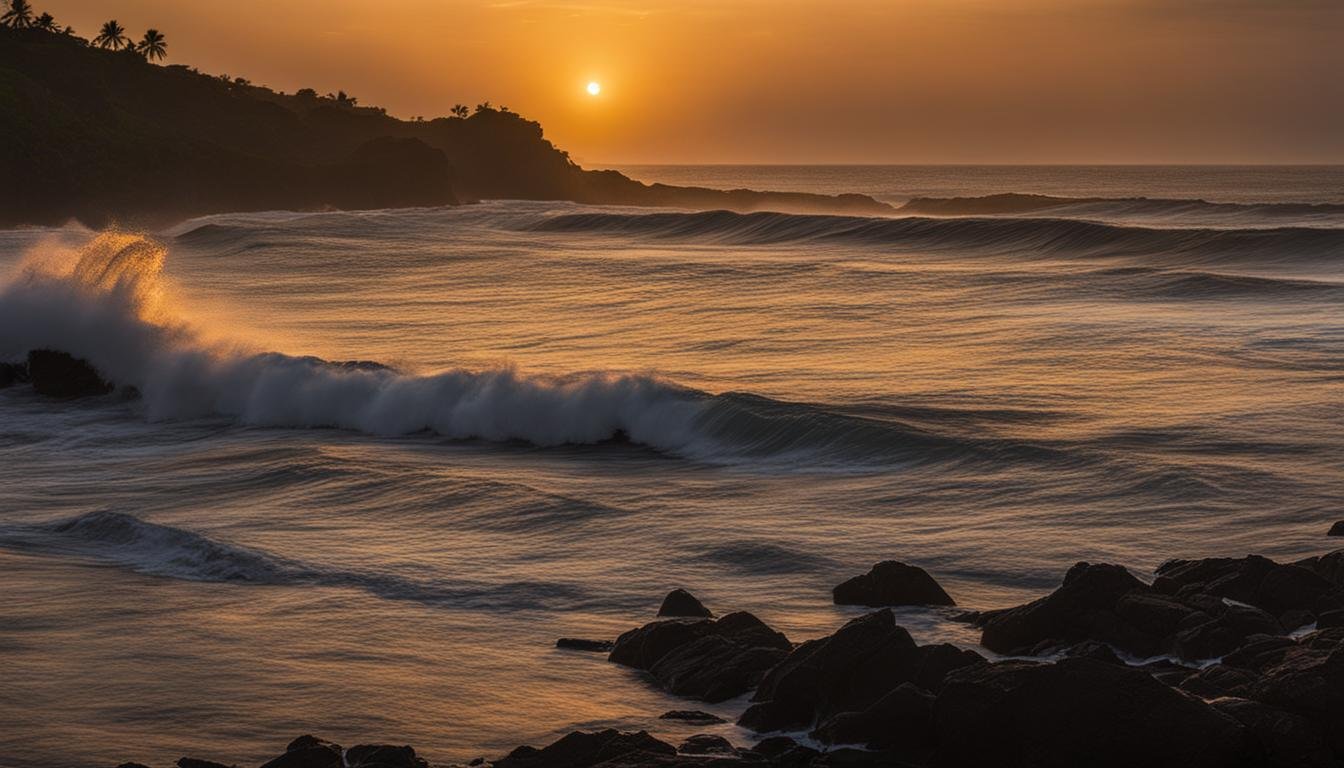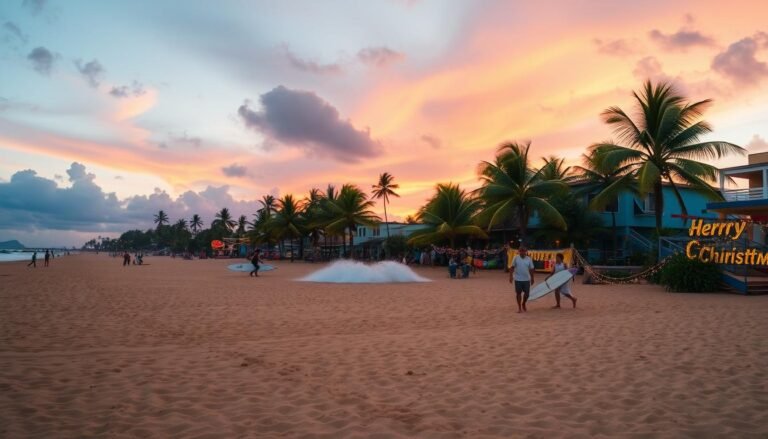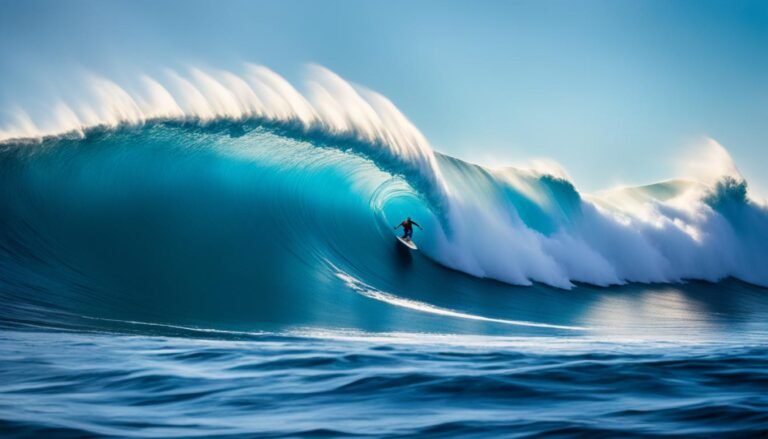Are you dreaming of catching epic waves in El Salvador? Planning a surf trip to this Central American gem is an excellent choice. With its world-class surf spots, warm water, and consistent swells, El Salvador offers a surfing experience like no other. But before you embark on your adventure, it’s important to be prepared and equipped with the right knowledge. Here are 10 crucial tips to help you plan the ultimate surf trip to El Salvador.
Key Takeaways:
- El Salvador offers excellent surf spots for all levels of surfers.
- Choose your surf spot wisely based on your skill level and wave preferences.
- The best surf season in El Salvador runs from November to April.
- El Zonte and El Tunco are recommended for beginners.
- Consider factors like beach quality and nightlife when choosing where to stay.
Where to Stay for Your Surf Trip in El Salvador
When planning your surf trip to El Salvador, one of the crucial decisions you’ll need to make is where to stay. El Zonte and El Tunco are two popular surf destinations that offer a range of surf camps and accommodations to suit different preferences and budgets.
El Zonte: Known for its nicer beach and less crowded waves, El Zonte is a great choice for surfers who prefer a quieter and more laid-back atmosphere. The beachfront accommodations in El Zonte provide easy access to the surf and stunning ocean views. You’ll find a variety of surf camps and guesthouses that offer comfortable rooms, communal spaces, and amenities like surfboard storage and rental.
El Tunco: If you’re looking for a vibrant nightlife scene and a bustling surf community, El Tunco is the place to be. This surf town is known for its lively atmosphere, with plenty of bars, restaurants, and shops to explore after a day in the water. The accommodations in El Tunco range from budget-friendly hostels to boutique hotels, offering options for every type of traveler.
When choosing where to stay, consider your surf level and preferences. If you’re a beginner or prefer a more relaxed environment, El Zonte may be the better choice. If you enjoy the social aspect of surfing and want to experience the lively surf culture, El Tunco is the ideal spot. Ultimately, both places offer fantastic surf opportunities and a unique experience in El Salvador.
Renting a Surfboard in El Salvador
If you’re planning a surf trip to El Salvador, one of the options you have is to rent a surfboard. Renting a surfboard is a convenient choice, especially if you don’t want to deal with the hassle of bringing your own board. In El Salvador, you can find surfboard rental shops where you can choose from a variety of boards suited to different wave conditions and surf levels.
The cost of renting a surfboard in El Salvador is typically around US$10-20 per day, depending on the type and quality of the board. If you’re planning to stay for a longer period, you may be able to negotiate a lower rental rate. Some surf camps and accommodations also offer surfboard rentals as part of their package, so it’s worth checking with your accommodation provider if they have any available.
However, if you plan to stay in one place for an extended time and are an experienced surfer with a preferred board, it may be more convenient to bring your own surfboard. This way, you can have the familiarity and comfort of riding your own board throughout your trip. Additionally, if your surfboard gets damaged during your trip, there are surfboard repair shops available in El Salvador where you can get it fixed. One of the recommended repair shops is Alexander’s in El Tunco, known for their quick and professional repairs.
Surfboard Rental Prices in El Salvador
| Rental Shop | Price per Day (US$) | Price per Week (US$) | Notes |
|---|---|---|---|
| Surf House | 10 | 60 | Includes leash and wax |
| El Tunco Surf Shop | 15 | 80 | Offers a wide selection of boards |
| Surf City | 20 | 100 | High-quality boards available |
“Renting a surfboard in El Salvador allows you to enjoy the waves without the hassle of bringing your own board. With a variety of rental options and repair shops available, you can find the perfect board for your surf trip.”
Whether you choose to rent a surfboard or bring your own, El Salvador offers excellent surf conditions and stunning waves for you to enjoy. With the right board in hand, you’ll be ready to ride the waves and make unforgettable memories in this surfers’ paradise.
Surf Lessons in El Salvador
If you’re a beginner or want to improve your surfing skills, there are several surf schools in El Salvador that offer lessons for every level. Taking surf lessons can help you gain confidence, learn proper techniques, and enhance your overall surfing experience.
Some recommended surf schools include:
- Surferos Surf School: Located in El Zonte, Surferos Surf School offers experienced instructors and a friendly learning environment. Whether you’re a complete beginner or looking to advance your skills, they have lessons tailored to your needs. Prices for surf lessons start at $20 per hour.
- Puro Surf Hotel & Academy: Situated in El Zonte, Puro Surf Hotel & Academy provides a comprehensive surf program for all levels. Their instructors are passionate about teaching and will help you progress in a safe and supportive environment. Surf lessons at Puro Surf Hotel & Academy range from $30 to $40 per hour.
- Surf Strong Surf School: Located in San Blas, Surf Strong Surf School offers personalized surf lessons for individuals and small groups. Their experienced instructors will guide you through the basics or help you refine your technique. Prices for surf lessons at Surf Strong Surf School start at $10 per hour.
Whether you choose Surferos Surf School, Puro Surf Hotel & Academy, or Surf Strong Surf School, you can expect professional guidance, quality instruction, and an opportunity to improve your surfing skills in the beautiful waves of El Salvador.
Testimonial from a Surfer
“I had an amazing experience taking surf lessons at Surferos Surf School in El Zonte. The instructors were patient, knowledgeable, and provided personalized feedback to help me progress quickly. I felt confident and ready to catch my own waves by the end of the lessons. I highly recommend Surferos Surf School for anyone looking to learn or improve their surfing skills in El Salvador!”
Whether you’re a beginner or an experienced surfer looking to refine your technique, taking surf lessons in El Salvador can be a great way to enhance your surf trip and make the most of the incredible waves this country has to offer.
Best Surf Spots in El Salvador
El Salvador, often referred to as the “surf city,” is home to numerous world-class surf spots that attract surfers from all around the globe. Whether you’re a beginner looking for gentle breaks or an experienced rider seeking challenging waves, El Salvador has something to offer for everyone. Here are some of the best surf spots in the country:
1. Sunzal
Sunzal is considered one of the most consistent and surf-friendly breaks in El Salvador. With its long and peeling right-hand point break, it’s a favorite among both locals and visitors. This spot offers ideal conditions for intermediate and advanced surfers, with waves ranging from chest-high to overhead. Sunzal is easily accessible from the town of El Tunco, making it a popular choice for surfers staying in the area.
2. Punta Roca
Punta Roca is known as one of the best right-hand point breaks in Central America. This powerful wave offers long rides and can reach heights of up to 12 feet. Punta Roca is recommended for advanced surfers due to its challenging reef break and the need for precise wave knowledge. Located near the town of La Libertad, Punta Roca is a must-visit spot for experienced riders looking for an adrenaline-filled surfing experience.
3. El Zonte
El Zonte is a picturesque beach town with consistent waves that cater to all surf levels. Its beach break provides fun and mellow waves, making it an excellent spot for beginners and those looking to improve their skills. El Zonte offers a laid-back atmosphere with plenty of surf camps and accommodations, making it a popular destination for surfers seeking a relaxed and enjoyable surfing experience.
4. Las Flores
Las Flores is a world-class right-hand point break located in eastern El Salvador. This spot offers long and hollow waves, often reaching heights of six to eight feet. Las Flores is suitable for intermediate to advanced surfers due to its fast and powerful breaks. Surrounded by pristine natural beauty, Las Flores provides a unique and unforgettable surfing experience for those willing to venture off the beaten path.
| Surf Spot | Experience Level | Wave Type | Location |
|---|---|---|---|
| Sunzal | Intermediate to advanced | Right-hand point break | El Tunco |
| Punta Roca | Advanced | Right-hand point break | La Libertad |
| El Zonte | All levels | Beach break | El Zonte |
| Las Flores | Intermediate to advanced | Right-hand point break | Eastern El Salvador |
Exploring Beyond the Waves in El Salvador
When planning a surf trip to El Salvador, it’s important to not only focus on the waves but also take the time to explore the attractions and natural beauty that the country has to offer. El Salvador is rich in cultural heritage and boasts stunning landscapes that are worth discovering. Here are some travel tips and attractions to consider during your visit:
1. Archaeological Sites and Mayan Ruins
El Salvador is home to several archaeological sites where you can explore the ancient Mayan civilization. One of the most notable sites is Joya de Cerén, often referred to as the “Pompeii of the Americas.” This UNESCO World Heritage Site provides a unique glimpse into the daily life of the Mayan people. Other significant sites include Tazumal, San Andrés, and Casa Blanca.
2. Coffee and Cacao Farms
El Salvador is known for its high-quality coffee and cacao production. Take a tour of one of the many coffee farms, such as the Santa Leticia Estate, where you can learn about the coffee-making process and sample freshly brewed cups. For chocolate lovers, a visit to a cacao farm like Cacao de Origen is a must. Experience the journey from bean to bar and indulge in the flavors of locally made chocolate.
3. Volcano Hiking and Natural Beauty
El Salvador is home to a chain of volcanoes, offering opportunities for hiking and breathtaking views. The Santa Ana Volcano, also known as Ilamatepec, is one of the most popular hiking destinations. The hike takes you through lush forests and up to the crater’s edge, where you can admire the turquoise-colored sulfuric lake. Other volcanoes to consider include Izalco and San Salvador Volcano.
| Attraction | Description |
|---|---|
| Archaeological Sites | Explore Mayan ruins and learn about ancient civilizations at sites like Joya de Cerén and Tazumal. |
| Coffee and Cacao Farms | Visit coffee and cacao farms to learn about the production process and sample delicious local coffee and chocolate. |
| Volcano Hiking | Hike up volcanoes like Santa Ana and enjoy stunning panoramic views of the surrounding landscapes. |
| Beach Towns and Beaches | Relax on the beautiful beaches of El Tunco, El Zonte, or Playa El Cuco and experience the vibrant surf culture. |
| Ruta de las Flores | Drive along the picturesque Ruta de las Flores to explore charming towns, art galleries, and colorful flower markets. |
These are just a few of the many attractions that El Salvador has to offer. Whether you’re seeking adventure, cultural experiences, or simply relaxation, the country has something for everyone. Remember to prioritize your safety and follow any guidelines or recommendations provided by local authorities.
Currency and Travel Tips for El Salvador
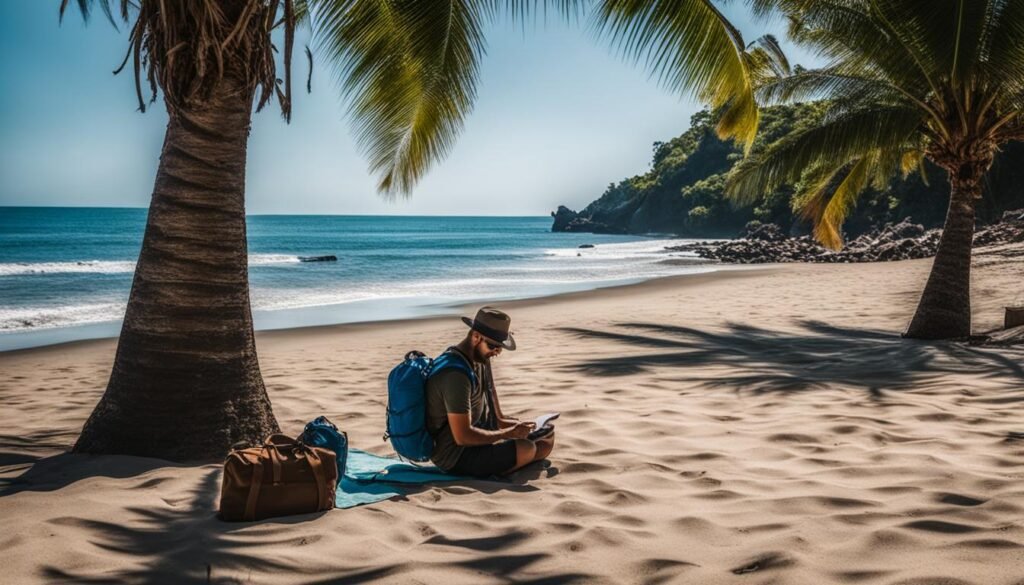
When planning a trip to El Salvador, it’s essential to familiarize yourself with the local currency and other important travel tips. Here are some key things to keep in mind:
1. Currency:
The official currency in El Salvador is the US dollar, so there’s no need to exchange money if you’re from the United States or use US dollars in general. However, it’s advisable to carry small bills as larger bills can be harder to break, especially in smaller establishments or rural areas.
2. Hiring a Driver:
While public transportation is available in El Salvador, it may be more convenient to hire a driver or use a tour operator when traveling between cities. This is especially true in the capital city of San Salvador, where traffic can be challenging and some roads may be unpaved in more remote areas.
3. Safety Precautions:
El Salvador has experienced some issues with gang violence in certain areas, so it’s important to be cautious and take appropriate safety precautions. Avoid walking alone at night, particularly in unfamiliar or higher-risk areas. Stay informed about the current situation and follow the advice of locals or your accommodation regarding safe areas to visit.
4. Health Tips:
Tap water in El Salvador is not recommended for drinking, so it’s best to stick to bottled water to avoid any potential contamination. Make sure to check the seal on the bottle before purchasing to ensure it hasn’t been tampered with. It’s also a good idea to pack any necessary medications or basic first aid supplies, just in case.
| EMERGENCY NUMBERS | DESCRIPTION |
|---|---|
| 911 | For any emergency assistance, including medical, police, or fire. |
| American Embassy in San Salvador | (+503) 2501-2999 |
By following these travel tips, you can have a safe and enjoyable experience exploring the beautiful country of El Salvador. Remember to always be respectful of the local culture and customs, and follow any additional guidelines or advice provided by your accommodation or tour operator.
Health and Safety in El Salvador
When planning your surf trip to El Salvador, it’s essential to prioritize your health and safety. By taking a few precautions, you can ensure a safe and enjoyable experience in this beautiful country.
Health Tips
Here are some health tips to keep in mind:
- Drink bottled water: To avoid any potential stomach issues, it’s recommended to drink bottled water throughout your stay. Avoid consuming tap water or ice made from tap water.
- Verify your vaccine needs: Before traveling to El Salvador, check if there are any required or recommended vaccinations for your country of origin. While there are no mandatory vaccines for most visitors, it’s always a good idea to stay up to date with routine immunizations.
- Bring bug repellent: El Salvador is known for its tropical climate, and mosquitoes can be present in certain areas. Protect yourself from mosquito-borne diseases by using insect repellent and wearing long sleeves and pants, especially during dawn and dusk.
Safety Tips
While El Salvador is a safe destination for tourists, it’s important to take common-sense precautions:
- Avoid walking alone at night: Stick to well-lit and populated areas, especially after dark. If you need to go somewhere, consider taking a taxi or using rideshare services.
- Stay informed about local news: Keep an eye on local news and stay informed about any current events or safety advisories in the area you plan to visit. This will help you make informed decisions and avoid any potential risks.
- Respect local customs and traditions: El Salvador has a rich cultural heritage, and it’s important to respect the customs and traditions of the local people. Dress modestly, especially when visiting religious sites, and be mindful of cultural sensitivities.
By following these health and safety tips, you can have a worry-free and memorable surf trip in El Salvador. Remember to always trust your instincts, be aware of your surroundings, and enjoy the incredible waves and hospitality that this country has to offer!
Understanding the History and Culture of El Salvador
Exploring the history and culture of El Salvador is an essential part of immersing yourself in the beauty and richness of this Central American country. El Salvador has a complex and fascinating history, shaped by Mayan civilizations, Spanish colonization, and a more recent period of civil war. By understanding the historical context, you can gain a deeper appreciation for the resilience and spirit of the Salvadoran people.
The Mayan Influence
El Salvador was once home to several Mayan civilizations, including the Pipil and Lenca tribes. The remnants of these ancient cultures can still be seen today in archaeological sites such as Joya de Cerén, known as the “Pompeii of the Americas.” This UNESCO World Heritage site provides a glimpse into the daily life of the indigenous people who inhabited the region centuries ago.
The Spanish Colonization
In the early 16th century, El Salvador was colonized by the Spanish, who introduced their language, religion, and customs to the region. The fusion of indigenous and Spanish influences laid the foundation for the vibrant culture that exists in El Salvador today. From traditional dances like the “Danza de los Diablitos” to the colorful handicrafts produced by local artisans, Salvadoran culture is a unique blend of indigenous and European traditions.
The Legacy of Civil War
From 1980 to 1992, El Salvador experienced a devastating civil war that deeply impacted the country and its people. This conflict, fueled by political and social inequality, resulted in the loss of thousands of lives and widespread displacement. Understanding this period of history is crucial in order to appreciate the resilience and strength of the Salvadoran people, who continue to rebuild and forge a brighter future.
Embracing Salvadoran Culture
When visiting El Salvador, take the time to immerse yourself in its vibrant culture. Sample the delicious local cuisine, such as pupusas, a traditional dish made from corn tortillas filled with cheese, beans, or meat. Engage with the locals, who are known for their warmth and hospitality, and learn about their traditions and customs. Give yourself the opportunity to attend a traditional folk dance performance or visit local markets where you can find unique handicrafts.
By understanding the history and culture of El Salvador, you can enrich your travel experience and develop a deeper connection to this beautiful country and its people.
Etiquette and Customs in El Salvador
When visiting El Salvador, it’s important to observe certain etiquette and customs to show respect for the local culture and make a positive impression. Here are some key customs and practices to keep in mind:
Greetings and Politeness
In El Salvador, greetings are an important part of daily interactions. It’s customary to greet people with a friendly “hola” (hello) or “buenos días” (good morning)/”buenas tardes” (good afternoon)/”buenas noches” (good evening). When meeting someone for the first time, a handshake is appropriate. When addressing people, it’s polite to use “señor” (Mr.) or “señora” (Mrs./Ms.) followed by their last name or a title. Being polite and using “por favor” (please) and “gracias” (thank you) goes a long way in showing respect.
Dress Code and Appearance
When visiting El Salvador, it’s important to dress modestly and respectfully, especially when visiting religious sites or rural areas. Both men and women should avoid wearing shorts, tank tops, or revealing clothing when entering Catholic churches. It’s also a good idea to bring lightweight, breathable clothing due to the country’s warm climate. Dressing appropriately shows respect for the local customs and traditions.
Tipping and Service Charges
Tipping is customary in El Salvador, particularly in restaurants, bars, and for services rendered. It’s customary to leave a tip of around 10 percent of the total bill, although some establishments may include a service charge. Always check your bill to see if a service charge has been added. Leave the tip in cash directly to the server or, if a service charge has been included, it’s still appreciated to leave a small additional tip for exceptional service.
| Custom | Etiquette |
|---|---|
| Greetings | Say “hola” or “buenos días”/”buenas tardes”/”buenas noches” when greeting someone. Use “señor” or “señora” when addressing someone. |
| Dress Code | Dress modestly and avoid revealing clothing when visiting religious sites or rural areas. |
| Tipping | Leave a tip of around 10 percent of the total bill, or additional if exceptional service is provided. |
Remember, demonstrating respect for the local customs and traditions can lead to a more enjoyable and meaningful experience in El Salvador.
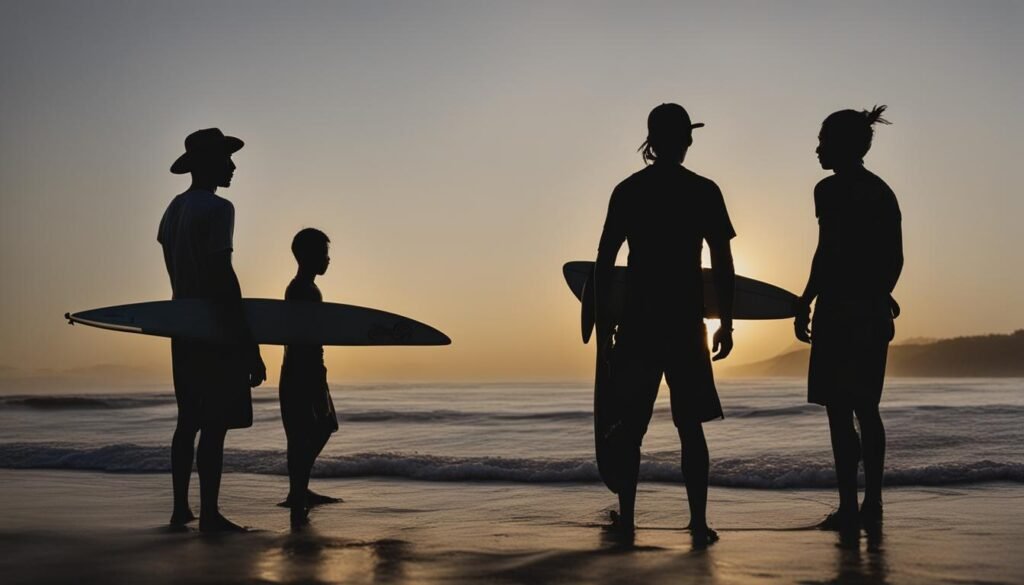
Conclusion
Planning a surf trip to El Salvador requires careful consideration and preparation. By following these travel tips, you can make the most of your surf trip and have an unforgettable experience.
El Salvador offers a diverse range of surf spots suitable for all levels, from beginners to advanced surfers. Choose your surf spot wisely based on your skill level and preferences. Whether you prefer smaller waves or bigger breaks, there is a spot in El Salvador for you.
Additionally, take advantage of the surf schools and accommodations available in popular surf destinations like El Zonte and El Tunco. These areas offer a vibrant surf scene and a range of options to suit your needs.
While enjoying the waves, it’s crucial to respect the local culture, observe etiquette, and prioritize safety. Remember to be mindful of your surroundings, especially when walking alone at night or in certain areas known for gang violence. By taking these precautions, you can ensure a safe and enjoyable surf trip in El Salvador.
FAQ
What are some popular surf spots in El Salvador?
Some popular surf spots in El Salvador include Sunzal, Punta Roca, El Zonte, and Las Flores.
What is the best surf season in El Salvador?
The best surf season in El Salvador runs from November to April.
Where should beginners stay for their surf trip in El Salvador?
Beginners are recommended to stay in El Zonte or El Tunco, which offer surf spots suitable for all levels.
Can I rent a surfboard in El Salvador?
Yes, you can rent a surfboard in El Salvador. The cost is usually around US$10-20 per day.
Are there surf schools in El Salvador?
Yes, there are surf schools in El Salvador that offer lessons for every level. Some recommended surf schools include “Surferos” Surf School in El Zonte, Puro Surf Hotel & Academy in El Zonte, and Surf Strong Surf School in San Blas.
What are some other attractions to explore in El Salvador?
In addition to surfing, you can visit archaeological sites with Mayan ruins, explore coffee and cacao farms, hike volcanoes, and enjoy the natural beauty of the country.
What currency is used in El Salvador?
The official currency in El Salvador is the US dollar.
What health and safety precautions should I take in El Salvador?
It’s important to stick to bottled water, verify your vaccine needs, and be aware of safety measures while traveling in El Salvador. Additionally, it’s recommended to hire a driver or tour operator when traveling between cities.
What is the history of El Salvador?
El Salvador has a rich history, including a civil war that took place from 1980 to 1992. It’s important to understand and respect the country’s past when visiting.
What customs should I observe in El Salvador?
When visiting El Salvador, it’s important to learn basic Spanish greetings, dress appropriately when visiting Catholic churches, and be respectful of the country’s recent history.



